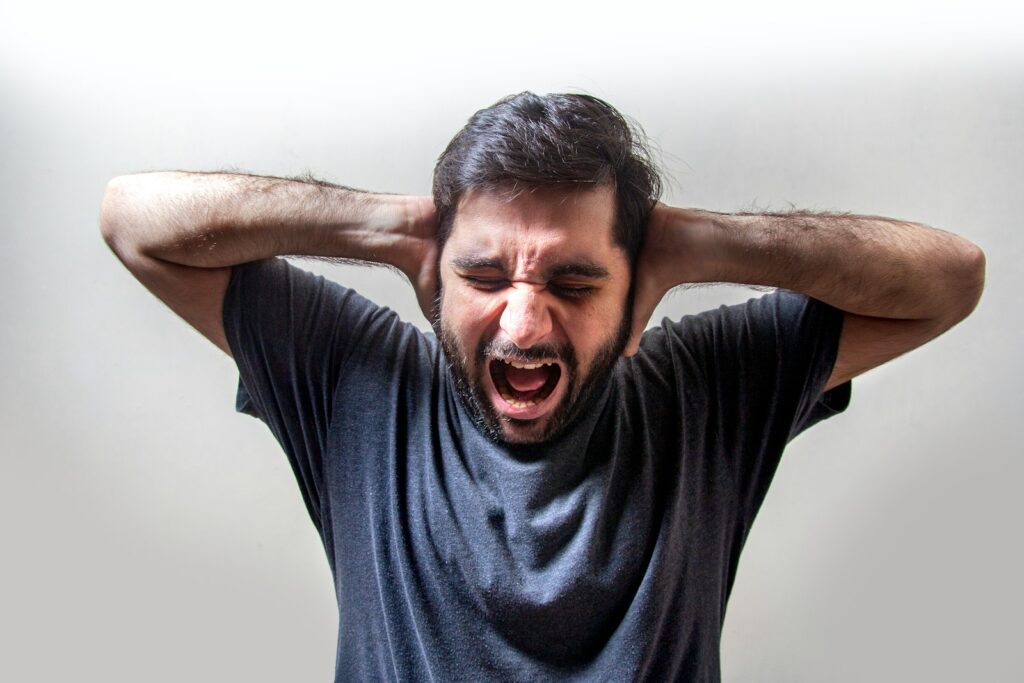Have you ever heard of situational anxiety? Ever felt a wave of intense anxiety right before a presentation or on a first date? That intense feeling of unease and nervousness is something many individuals experience in specific scenarios. Known as situational anxiety, it can be overwhelming but, with the right tools and support, it is completely manageable.
Many people experience situational anxiety in various scenarios, such as public speaking or social gatherings.
This guide will cover everything you need to know about situational anxiety, from understanding its triggers to practical steps for coping and even seeking professional help. Whether you’re facing social gatherings, a big job interview, or simply navigating stressful situations, we’re here to help you regain control.

Introduction to Anxiety
Anxiety is a prevalent mental health condition that impacts millions globally. It manifests as intense fear, worry, and nervousness, often disrupting daily life. Anxiety disorders encompass a range of conditions, including generalized anxiety disorder, social anxiety disorder, and situational anxiety, each affecting individuals differently. Generalized anxiety disorder involves persistent and excessive worry about various aspects of life, while social anxiety disorder is characterized by an intense fear of social situations. Situational anxiety, on the other hand, is triggered by specific events or circumstances.
Recognizing the symptoms of these anxiety disorders is crucial. Common signs include rapid heartbeat, sweating, and difficulty concentrating. Treatment options vary but often include a combination of therapy, medication, and self-care strategies. Understanding anxiety and its impact on mental health is the first step toward developing effective coping strategies and seeking professional help when necessary.
Ready to Start Therapy?
Your healing journey can begin today. Fill out the form below to connect with a therapist who truly listens and understands.

What is Situational Anxiety?
Unlike generalized anxiety disorder, situational anxiety is tied to a specific situation or event. It’s a type of anxiety that arises when you anticipate or encounter a situation that causes fear or stress. Common examples include public speaking, job interviews, social gatherings, or flying.
Though situational anxiety often resolves itself once the stressful event is over, the physical symptoms and intense fear can feel debilitating in the moment. Recognizing these emotions as a normal part of life and learning how to manage anxiety can be beneficial.
Recognizing Symptoms of Situational Anxiety
Situational anxiety symptoms often present themselves with physical and emotional signs, such as:
- Physical symptoms like a rapid heartbeat, sweating, shortness of breath, or difficulty concentrating.
- Mental signs, including intense fear, irritability, or dwelling on negative outcomes.
By recognizing these symptoms, you can identify when you’re feeling situational anxiety and take steps to manage it effectively.
Common Triggers of Situational Anxiety
From preparing for a job interview to meeting someone new for a date, common triggers for situational anxiety tend to revolve around unfamiliar or high-pressure situations. These include:
- Public speaking: For example, presenting at work or giving a toast at an event.
- Job interviews: Feeling unprepared or overthinking potential outcomes can heighten stress.
- Social situations: Attending a gathering with new people or managing social anxiety.
- Travel: Visiting new places or flying for the first time.
Identifying these identifiable triggers can help you prepare and manage your anxiety more effectively.
Environmental factors, such as changing jobs or moving to a new city, can also trigger situational anxiety. Identifying your personal triggers is the first step in preparing to face them with confidence.

How to Manage Situational Anxiety
Managing situational anxiety requires a blend of strategies aimed at both the mind and body. Here are some highly recommended methods for beginning your management process:
Effective treatments for situational anxiety often involve a combination of relaxation techniques, cognitive strategies, and professional help.
1. Practice Relaxation Techniques
Relaxation tools can help calm your body and mind. Some of the most effective techniques include:
- Deep Breathing: Focus on taking slow, deep breaths to reduce stress levels.
- Progressive Muscle Relaxation: Gradually work through different muscle groups, tensing and releasing them to relieve tension.
- Physical Exercise: Activities like walking, yoga, or even dancing release endorphins and can reduce symptoms of anxiety.
Being adequately prepared with these techniques can significantly reduce anxiety levels.
2. Address Negative Thoughts
Negative thoughts tend to escalate situational anxiety. Combat them with these strategies:
- Positive Self-Talk: Replace “I’m going to mess this up” with “I am capable of handling this situation.”
- Challenge Unhelpful Thoughts: Question whether the worst-case scenario is really as likely as it feels.
Negative experiences from the past can often fuel these unhelpful thoughts, making it crucial to address them.
3. Develop Practical Coping Strategies
Prepare in Advance: For example, rehearse what you might say in an interview or prepare a script for a hard conversation.
Break Down the Challenge: Take the stressor piece by piece instead of overwhelming yourself with the bigger picture.
Create a Self-Care Plan: Incorporate enough sleep, a balanced diet, and moments of joy into your daily life to build resilience. While it may be tempting to avoid situations that cause anxiety, facing them with practical strategies can lead to better outcomes.

Healthier Ways to Cope
Finding productive outlets and support can make a significant difference when feeling anxious about certain situations. Avoiding unhealthy coping strategies, such as substance abuse, is crucial for long-term mental health. Try these approaches for healthier coping:
- Engage in Physical Activity: Activities like jogging or swimming help reduce excess adrenaline.
- Seek Social Support: Open up to a trusted friend, family member, or therapist. Their perspective and encouragement can often help calm fears.
- Use Mindfulness Techniques: Apps such as Calm or Headspace guide you through guided meditations or breathing exercises.
Building Resilience
Building resilience is a powerful way to handle situational anxiety and other mental health conditions. Understanding the temporary nature of situational anxiety can help you build resilience and face challenges more confidently. Here’s how to strengthen your emotional and mental resilience:
- Focus on Problem-Solving Skills: When dealing with situations, focus on solutions instead of the problem.
- Develop a Growth Mindset: Learn to accept setbacks as opportunities for growth.
- Engage in Meaningful Activities: Hobbies like art, travel, or gardening can shift your focus and bring fulfillment.

Overcoming Negative Thoughts
Negative thoughts can significantly contribute to anxiety, making it challenging to manage. Overcoming these thoughts involves a blend of self-awareness, cognitive-behavioral therapy (CBT), and positive self-talk. For those experiencing situational anxiety, learning to identify and challenge negative thoughts is essential. Replace thoughts like “I can’t handle this” with more balanced and realistic ones, such as “I am prepared and capable.”
Symptoms of situational anxiety, such as a rapid heartbeat, difficulty concentrating, and intense fear, can be alleviated by practicing relaxation techniques. Deep breathing exercises and progressive muscle relaxation can help calm the mind and body, reducing anxiety symptoms. By incorporating these strategies, individuals can manage anxiety more effectively and improve their overall mental health.
Seeking Professional Help
When situational anxiety interferes with daily life, it’s time to seek help. Mental health professionals, such as therapists or psychologists, can work with you to develop a tailored treatment plan. Common treatments include:
- Talk Therapy: Techniques like Cognitive Behavioral Therapy (CBT) help identify and change negative thought patterns.
- Medication: Selective serotonin reuptake inhibitors or beta-blockers may be prescribed to alleviate more severe symptoms.
Professional treatment can provide the support and tools needed to manage situational anxiety effectively.
Never hesitate to reach out. Early intervention can significantly improve your ability to manage situational anxiety.

Create an Anxiety Management Plan with a Professional
Creating a personalized plan with a mental health provider ensures effective coping strategies are in place. Your plan might include:
- Combination therapies like relaxation techniques, such as deep breathing, alongside talk therapy.
- Identifying specific situations that trigger anxiety and addressing them one by one.
A comprehensive mental health treatment plan can include various therapies and strategies tailored to your needs.
Improving Mental Health
Improving mental disorders is vital for managing situational anxiety and other anxiety disorders. This can be achieved through a combination of self-care strategies and professional support. Ensuring you get enough sleep, engaging in regular physical exercise, and practicing relaxation techniques are foundational steps. Physical exercise, in particular, helps release endorphins, which can reduce anxiety symptoms.
Seeking help from a mental health professional can provide additional tools and support. Therapists can offer techniques like cognitive-behavioral therapy (CBT) to help manage anxiety.
Understanding anxiety symptoms, triggers, and treatment options empowers individuals to make informed decisions about their care. By prioritizing mental health and seeking help when needed, individuals can reduce their risk of developing more severe mental health conditions, such as generalized anxiety disorder, and enhance their overall well-being.

Empower Yourself to Manage Situational Anxiety
Situational anxiety is normal, and it doesn’t have to hold you back from living a fulfilling life. By recognizing triggers, practicing effective strategies, and seeking help when necessary, you can regain control and face life’s challenges with confidence. It’s normal to feel anxious in certain situations, but with the right strategies, you can manage these feelings effectively.
If you’re ready to take the next step, schedule a consultation with a mental health professional today. Your mental health matters, and support is always available.
Resources to Help with Anxiety
If you’re looking for tools to better understand and manage anxiety, here are some trusted resources to explore:
- Anxiety and Depression Association of America (ADAA): ADAA Website – The ADAA provides evidence-based resources, support groups, and professional connections to help those dealing with anxiety and depression.
- National Institute of Mental Health (NIMH): NIMH Website – A leading authority in mental health research, the NIMH offers comprehensive information on anxiety disorders, symptoms, and available treatments.
- Calm App: Calm Website– This app provides guided meditation, relaxation techniques, and sleep aids to help reduce stress and anxiety in daily life.
- Mind.org (UK): Mind Website – A nonprofit organization offering resources, advice, and support for anyone struggling with mental health concerns, including anxiety.
- SAMHSA National Helpline: SAMHSA Helpline Details – A confidential, 24/7 helpline offering support, treatment referrals, and information for those facing mental health challenges in the U.S.
- Mental Health America (MHA): MHA Resources – An organization committed to addressing the needs of those living with mental illness and promoting mental health as a critical part of overall wellness through advocacy, education, and support services.
- The Trevor Project: Trevor Project Website – A crisis intervention and suicide prevention organization for LGBTQIA+ youth, offering 24/7 support through phone, text, and chat services.
- Crisis Text Line: Crisis Text Line Details – A free, around-the-clock text-based support service for anyone experiencing emotional distress or mental health crises. Text HOME to 741741 to connect with a trained counselor.
These resources can provide valuable insights, guidance, and support as you work toward managing anxiety effectively. Consider reaching out to one or more of these organizations or using their tools as part of your wellness plan.


